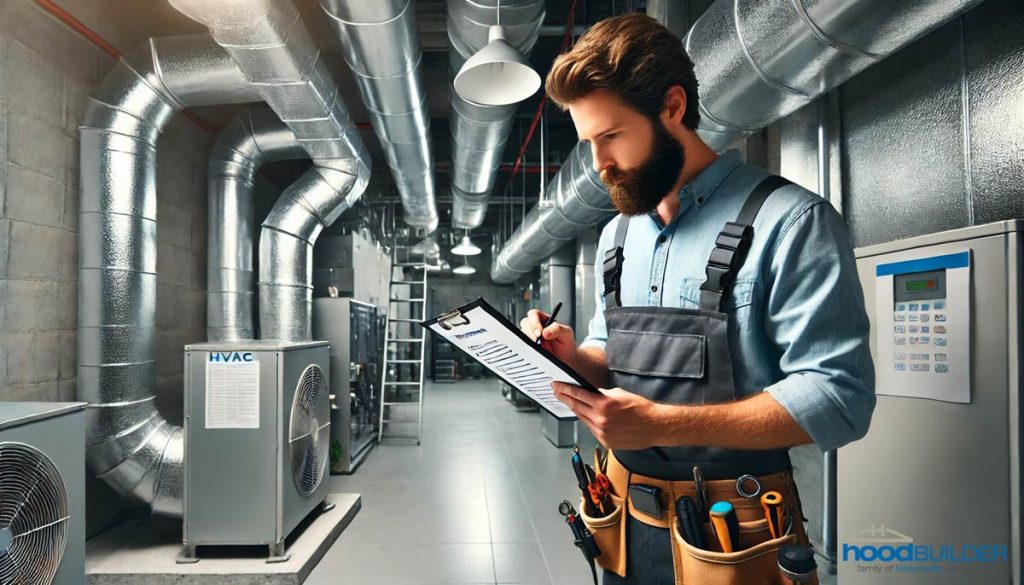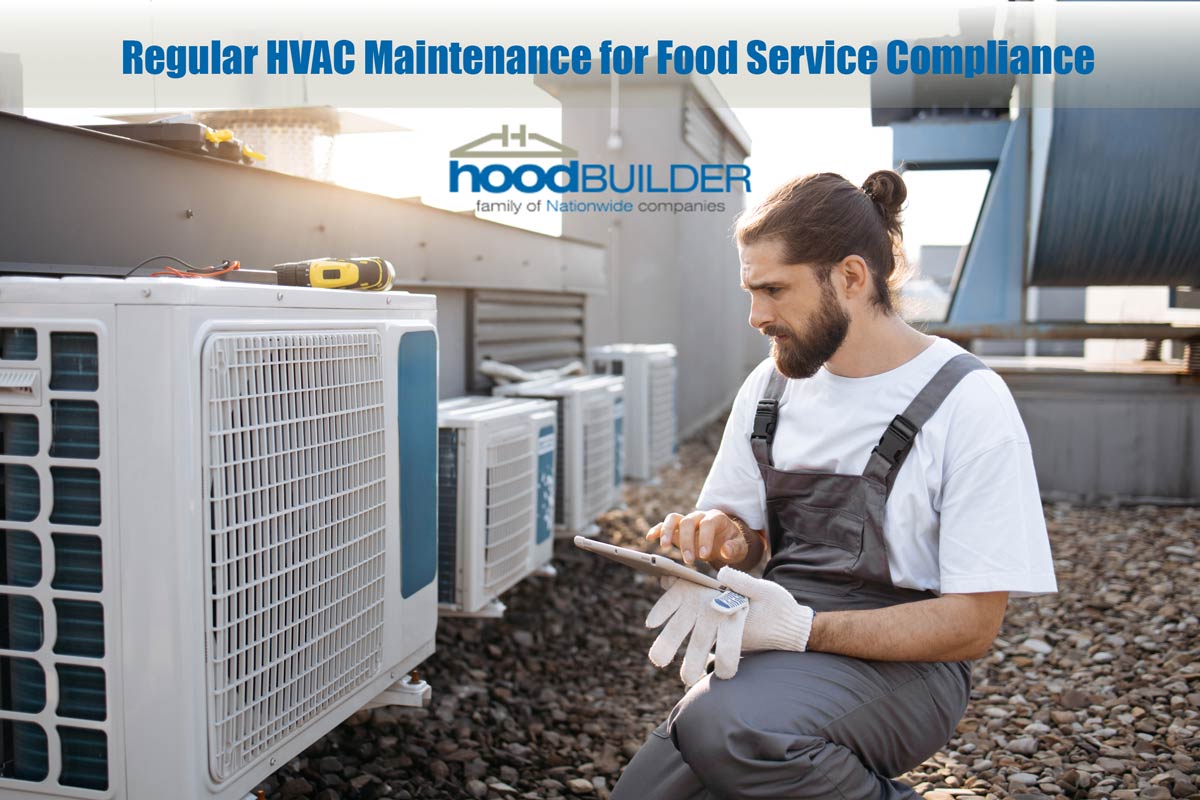Running a successful restaurant or cafe requires juggling countless responsibilities, from providing exceptional customer service to maintaining high food quality. Yet, one often-overlooked aspect can make or break your business—compliance with local and federal regulations. Among these, HVAC system maintenance stands out as a critical requirement for ensuring safety, efficiency, and a positive dining experience.
Did you know? Studies show that over 60% of restaurant closures are linked to compliance issues, including HVAC system failures. Neglecting your HVAC system can result in hefty fines, health code violations, and even temporary or permanent business closure. Don’t let something preventable put your establishment at risk!
In this article, we’ll explore essential HVAC-related regulations for food service businesses and provide a practical action plan to keep your equipment compliant and efficient. With these tips, you can protect your business, improve customer satisfaction, and even lower operating costs.
Is Your HVAC System Up to Code? Call Hood Builder at 303-777-7720 for a professional inspection and maintenance of your HVAC systems. With our expertise, you’ll not only meet compliance standards but also create a safe, inviting space for customers and employees alike.
Why HVAC Maintenance is a Non-Negotiable Priority for Restaurants
The HVAC system is the backbone of your restaurant’s comfort, safety, and compliance. From regulating temperatures to maintaining air quality, this complex machinery plays a crucial role in your daily operations. Neglecting its maintenance, however, can lead to costly repairs, health code violations, and a tarnished reputation that’s hard to recover from.
No customer wants to dine in a restaurant with uncomfortable temperatures or stale, polluted air, and no employee can perform at their best under such conditions. Regular HVAC maintenance isn’t just an operational necessity—it’s a legal, financial, and reputational safeguard for your food business. Let’s dive into the critical reasons why you need to prioritize your maintenance plan today.
The Legal Perspective: Stay on the Right Side of the Law
- Health and Safety Compliance:
Poorly maintained HVAC systems can lead to suboptimal indoor air quality, mold growth, and unpleasant odors—all of which violate workplace safety and health codes. Health inspectors take these issues seriously and may impose fines or temporarily shut down your business for non-compliance.
- Fire Safety Regulations:
In a busy commercial kitchen, grease and smoke build-up in ducts and exhaust systems can become a fire hazard. Regular inspections ensure your ventilation hoods and fire suppression systems meet legal safety requirements.
- Contractual Liabilities:
Most insurance policies and equipment warranties require proof of regular HVAC maintenance. Failure to comply can result in denied claims and costly out-of-pocket expenses.
The Business Perspective: Save Costs and Protect Your Reputation

- Lower Energy Bills:
Well-maintained HVAC systems run more efficiently, reducing energy consumption and saving you money on utility bills. A neglected system, on the other hand, uses more power and costs significantly more to repair when it breaks down.
- Boost Productivity and Customer Satisfaction:
Clean, well-functioning HVAC systems create a comfortable environment for both your staff and customers. Employees perform better when they’re not battling extreme temperatures, and satisfied patrons are more likely to return and leave positive reviews.
- Prevent Costly Downtime:
Emergency repairs can lead to unexpected downtime, disrupting your operations and revenue. Proactive maintenance ensures your business keeps running smoothly.
The Environmental Perspective: Go Green and Save Green
Sustainability is becoming a priority for consumers. An efficient HVAC system reduces your restaurant’s carbon footprint by consuming less energy. Taking steps toward greener practices not only benefits the planet but also attracts eco-conscious diners to your establishment.
Health Code HVAC Requirements for Food Service Businesses: What You Need to Know
When it comes to running a food service establishment, compliance with health and safety codes isn’t just a recommendation—it’s the law. Your HVAC system plays a pivotal role in maintaining a safe and hygienic environment. Meeting these requirements ensures not only the health and well-being of your staff and patrons but also the continued operation of your business.
Here are the essential HVAC-related health code requirements that every food service business must adhere to:
Key HVAC Requirements for Food Service Compliance
| Requirement | Description |
| Ventilation Hoods with Fire Suppression Systems | Food service providers must install properly designed ventilation hoods equipped with fire suppression systems to minimize fire risks in commercial kitchens. |
| Makeup Air Systems | A makeup air system ensures proper airflow by introducing fresh air to replace the air exhausted from the kitchen, maintaining balance and preventing negative pressure. |
Exhaust Systems for Grease and Smoke | Proper exhaust systems are required to effectively remove grease, smoke, and other contaminants from the kitchen to ensure a safe and clean environment. |
Why These Requirements Matter
- Legal Compliance:
Health departments and fire safety inspectors enforce these codes rigorously. Failing to meet these standards can result in hefty fines, temporary closures, or even the revocation of your operating license.
- Fire Hazard Prevention:
In a busy commercial kitchen, grease buildup in exhaust systems can lead to severe fire risks. Proper ventilation and fire suppression systems are your first line of defense.
- Air Quality and Odor Control:
Without adequate ventilation, airborne contaminants, smoke, and odors can negatively impact the dining experience and your staff’s productivity.
Consequences of Non-Compliance
Ignoring HVAC health code requirements can have severe consequences for your business, including:
- Financial Penalties: Non-compliance fines can range from hundreds to thousands of dollars, depending on the severity of the violation.
- Business Interruptions: A failed inspection may force your establishment to close temporarily until you address the issues.
- Reputational Damage: Poor air quality or a health code violation can lead to negative reviews and a loss of customer trust.
Stay Ahead of the Curve with Proactive Maintenance
Compliance is not a one-time achievement—it’s an ongoing process. Ensure your HVAC systems are always up to code with regular inspections, maintenance, and upgrades. If you’re planning a new HVAC installation for your restaurant or need help ensuring your current system meets health code standards, Hood Builder has you covered.
Pro Tip: Check out our related article, The Importance of Proper Commercial Kitchen Ventilation, for an in-depth guide on creating a safe and efficient kitchen environment.
The HVAC Inspection Checklist Every Food Service Business Needs
Ensuring your HVAC system meets health code requirements and operates efficiently is a cornerstone of running a successful food service business. Regular inspections and maintenance not only keep your systems compliant but also prevent costly breakdowns, improve indoor air quality, and ensure a comfortable environment for both staff and customers.
To help you stay ahead, we’ve created a comprehensive HVAC inspection checklist tailored for food service businesses. Follow these steps to safeguard your business from fines, downtime, and negative reviews.
The Essential HVAC Inspection Checklist for Restaurants and Cafes
- Install Appropriate Ventilation Hoods
- Ensure your kitchen has the right hoods equipped with fire suppression systems to manage grease and smoke effectively.
- Verify that the hoods are installed according to local codes and inspected regularly.
- Clean and Maintain Ducts
- Schedule regular cleaning of ducts to prevent grease buildup, which can become a fire hazard.
- Maintain clean ducts to improve air circulation and eliminate unpleasant odors.
- Balance Airflow with Makeup Air Systems
- Inspect your makeup air system to ensure it balances airflow, preventing negative pressure that could disrupt kitchen operations.
- Ensure Proper Ventilation of Exhaust Air
- Test your exhaust systems to confirm they are effectively removing smoke, grease, and airborne contaminants from the kitchen.
- Check for blockages or damage to exhaust fans and vents.
- Monitor Indoor Air Quality and Temperature
- Use air quality monitors to ensure your HVAC system is maintaining a healthy and comfortable environment for staff and patrons.
- Adjust temperature settings seasonally for energy efficiency and comfort.
- Inspect and Replace Filters
- Regularly check HVAC filters for dust, grease, or clogging and replace them as needed to maintain system efficiency.
- Use high-quality filters to reduce allergens and improve air quality.
- Check Refrigerant Levels
- Inspect refrigerant levels in cooling systems to ensure they are operating efficiently and avoid unexpected failures.
- Test Fire Suppression Systems
- Regularly inspect and test fire suppression systems to ensure they are functioning correctly and comply with safety regulations.
- Document inspections for health and safety compliance purposes.
- Maintain and Document HVAC Systems
- Keep detailed records of all inspections, repairs, and maintenance tasks to meet compliance requirements and support insurance claims if needed.
- Train Staff on HVAC Awareness
- Provide your team with training on the importance of HVAC maintenance, how to identify potential issues, and when to call for professional assistance.
Why This Checklist Matters
- Prevention is Key: Proactive maintenance prevents small issues from escalating into costly repairs or dangerous situations.
- Legal Compliance: Following this checklist ensures your HVAC systems meet health code and safety regulations.
- Enhanced Customer Experience: A comfortable and odor-free environment keeps customers happy and encourages repeat visits.
- Operational Efficiency: Well-maintained systems operate more efficiently, saving you money on energy bills and reducing your environmental footprint.
Download Your Free HVAC Compliance Checklist

Stay ahead of inspections and keep your restaurant running smoothly with our HVAC Compliance Checklist. This printable guide helps you:
- Ensure your HVAC system meets health and safety standards.
- Stay compliant with ventilation, exhaust, and fire suppression requirements.
- Prevent costly fines and business interruptions.
Click here to download your free checklist and take control of your HVAC maintenance today!
Protect Your Business Today! Call Hood Builder at 303-777-7720 for a free consultation and quote. From installation to regular maintenance, Hood Builder ensures your HVAC systems are running smoothly and in compliance.
Frequently Asked Questions About HVAC Maintenance for Food Service Compliance
Why is HVAC maintenance critical for food service compliance?
Regular HVAC maintenance is essential to meet health code regulations and ensure a safe environment. Well-maintained systems improve air quality, regulate temperature, and reduce fire risks. They also prevent costly repairs and downtime, helping your business operate smoothly and avoid penalties.
What are the key health code HVAC requirements for restaurants?
The most important requirements include ventilation hoods with fire suppression systems to control grease and smoke, makeup air systems to balance airflow, and proper exhaust systems to remove airborne contaminants. Complying with these requirements ensures safety and avoids fines or closures.
How does proper HVAC maintenance save costs?
Maintaining your HVAC system reduces energy consumption, prevents expensive repairs, and extends equipment lifespan. It also eliminates fines and interruptions due to compliance violations, ultimately improving your bottom line.
How often should HVAC systems in a restaurant be inspected?
Weekly or monthly checks are recommended for filters and basic cleaning, while quarterly inspections should focus on hoods, ducts, and exhaust systems. Professional maintenance should be scheduled annually to ensure all components meet regulatory and performance standards. The Department of Energy recommends a required inspection once a year.
What are some signs that my HVAC system needs attention?
Warning signs include unpleasant odors, excessive grease buildup, inconsistent temperatures, poor air quality, and unusual noises. Issues with fire suppression systems or false alarms also indicate that your HVAC system requires immediate maintenance.
How can poor HVAC maintenance impact my business’s reputation?
An uncomfortable dining environment caused by poor air quality or temperature issues can lead to bad reviews and lost customers. Maintaining your HVAC system ensures a positive experience for patrons, encouraging repeat visits and recommendations.
What are the legal consequences of failing to maintain HVAC systems in a food establishment?
Consequences include health code violations, fines, and potential business closures. Non-compliance with insurance or warranty requirements can also result in denied claims, leaving you liable for costly repairs.
How can I train my staff to be more aware of HVAC system maintenance?
Train your staff to identify issues such as airflow problems, strange noises, or grease buildup. Encourage regular cleaning and filter changes, and hold periodic briefings with HVAC professionals to ensure your team understands the importance of maintenance.
Final Takeaways: Protect Your Business with Regular HVAC Maintenance in Denver, CO
Your restaurant’s HVAC system is more than just a piece of equipment—it’s the backbone of your food service operations. From maintaining compliance with health and safety regulations to creating a comfortable dining environment, regular HVAC maintenance is non-negotiable for success in the food industry.
A proactive approach to HVAC maintenance can offer a host of benefits:
- Regulatory Compliance: Stay on the right side of local, state, and federal laws by keeping your HVAC system up to code. This prevents costly fines, negative inspections, and potential shutdowns.
- Happy Customers: A well-maintained system ensures proper airflow and temperature control, creating a comfortable and inviting atmosphere that keeps patrons coming back.
- Efficient Operations: Optimized HVAC systems use less energy, saving you money on utility bills and reducing your environmental footprint.
- Reduced Downtime: Routine maintenance helps identify potential issues before they escalate, preventing unexpected breakdowns that disrupt service.
- Boosted Reputation: Satisfied customers and a safe working environment lead to positive reviews and increased business.
By using the actionable steps in this article, you can take control of your HVAC system’s maintenance, enhance your business operations, and meet all health and safety requirements. From installing proper ventilation hoods to training staff on HVAC awareness, these strategies will help you protect your investment and foster long-term success.
Success Story: How Hood Builder Helped a Local Restaurant Stay Compliant and Thrive
When a popular local bistro in Denver faced multiple health code violations due to outdated HVAC systems, they turned to Hood Builder for help. The restaurant was struggling with poor air quality, grease buildup in their ventilation ducts, and a fire suppression system that hadn’t been serviced in years. These issues not only posed a significant safety risk but also led to negative customer reviews and reduced foot traffic.
After conducting a thorough inspection, the Hood Builder team implemented a customized solution that included:
- Installing new, state-of-the-art ventilation hoods with fire suppression systems.
- Performing a complete duct cleaning to eliminate grease buildup and improve airflow.
- Upgrading their makeup air system to maintain proper airflow balance.
- Providing staff training on HVAC awareness and regular maintenance practices.
The results were immediate and impressive. The restaurant passed its next health inspection with flying colors, and customer satisfaction soared as diners noticed the improved air quality and more comfortable environment. Positive reviews on platforms like Yelp and Google started to pour in, boosting their reputation and revenue.
Owner’s Testimonial:
“Working with Hood Builder was a game-changer for our restaurant. Not only did they help us get back into compliance, but they also created a safer, more welcoming space for our staff and customers. Their expertise and professionalism were second to none!”
See all our clients and read their testimonials here.
Ready to Stay Compliant and Safe? Trust the Experts at Hood Builder
Maintaining a safe and compliant food service business doesn’t have to be complicated. At Hood Builder, we specialize in HVAC solutions tailored to restaurants and commercial kitchens. From installation to regular maintenance, our experts are here to help you meet regulations, reduce costs, and provide an exceptional environment for your customers and staff.
Why Choose Hood Builder?
- Decades of experience in the food service industry.
- Comprehensive services, including HVAC installation, maintenance, fire suppression systems, and more.
- Commitment to keeping your business compliant, efficient, and safe.
Take the First Step Toward Compliance Today!
Don’t wait until your next health inspection—contact Hood Builder today at 303-777-7720 to schedule a free consultation and inspection.

